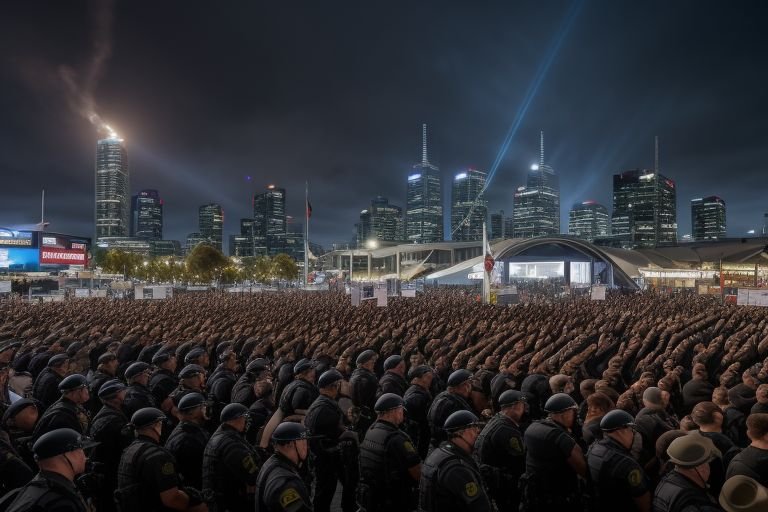The protests at the Land Forces expo remain as heated as ever in Melbourne as the event heads into its last day. The event that unites representatives of the world’s defense and weapons industries has caused strong criticism from anti-war activists and human rights organizations.
Today a charged moment occurred when a woman poured concrete and attached the concrete-encased hand to the wheel of the car that prevents traffic on King Street. It took the police an angle grinder to free the woman before they arrested her. This act of civil disobedience shows how far some of the protesters are ready to get their message across against the arms trade and military expenditures.
Protests started on Wednesday and the intensity of protesters’ actions and police’s reaction has been increasing day by day. The first day witnessed many people getting injured and arrested and aggressive actions by the police force but from the second day there has been a slight easing of tensions. However, the tension is still there as the activists keep on demanding for more openness and accountability in defense policies.
Victoria Police have continued to patrol the event heavily with the Chief Commissioner Shane Patton supporting the use of crowd control measures including foam bullets and pepper spray. These tactics have been criticized by the human rights organizations and the Victorian Greens who want an independent investigation of the police conduct during protests.
Some of the issues arising from the expo and the related protests have been economic. While Premier Jacinta Allan and Melbourne Lord Mayor Nick Reece have stressed on the positive economic impacts associated with such events, several business owners in the areas where roads are closed and traffic is disrupted have complained of their business loss.
As the expo is about to end, uncertainties arise as to the continuation of similar fairs in Melbourne and the consequences of the suppression of protest actions for civil liberties in Australia. The protests have initiated key discourses regarding the applicability of the defense industry in urban areas and the economic and moral dualism.
Nevertheless the Land Forces expo has drawn delegates from 45 countries and thus confirms Melbourne as an important conference city. But the intensity of the protest that people display is always a reminder of the fact that the defense industry is not a straightforward one and is usually a subject of controversy.
As Melbourne looks to the future and deals with the questions of what happened in the last few days, the citizens and policy makers are faced with questions about the direction of defense policy, the right to protest and the identity of Melbourne as the international city hosting major events.
The consequences of the Land Forces expo and the protests that accompanied it will likely be felt for some time to come, which could possibly affect the decisions of future hosts of such events and the authorities’ approach to public assemblies.

